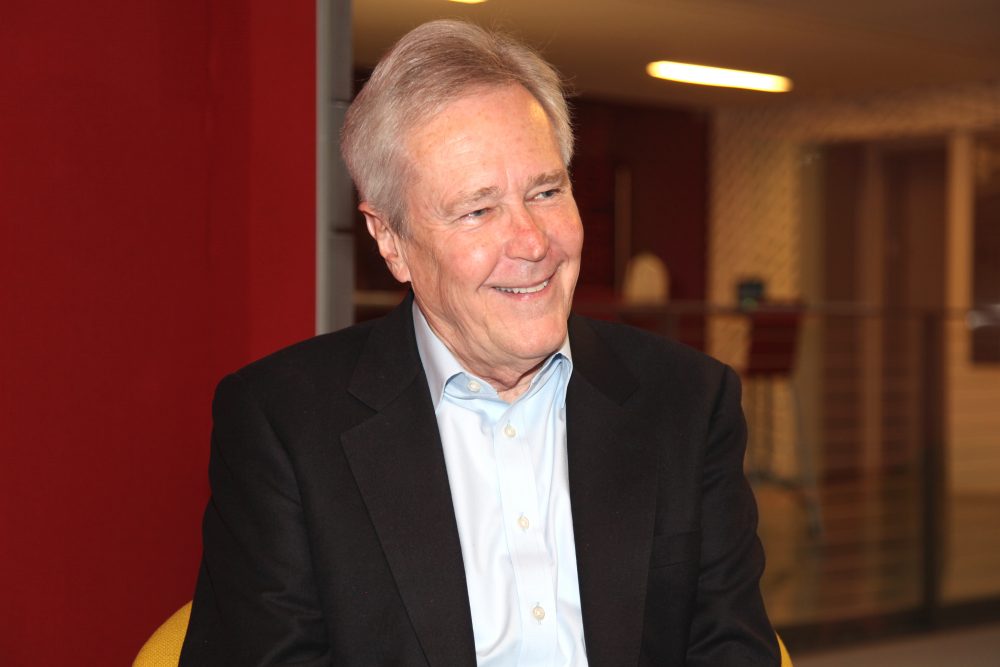
Photo by Aaron Salcido.
James Fallows has been a national correspondent for The Atlantic for more than 35 years. He is the author of 11 books, as well as the just-published Our Towns: A 100,000-Mile Journey into the Heart of America, written with Deborah Fallows. For two years he was President Jimmy Carter’s chief speechwriter. Before taking part in a Zócalo Public Square event titled “Are Small Towns Reinventing America?” at The RedZone at Gensler in downtown Los Angeles, he spoke in the green room about what’s hanging on his walls, what he learned from traveling cross-country with his wife, and being a small-town boy himself.
What was it like to travel and work together on this book with your wife Deborah Fallows? Did you learn anything about her professionally?
I didn’t know anybody else who has continued to master as many new areas as Deb has. She started out as a linguist and she’s really good in languages, in every place we’ve lived: When we were in Malaysia, when we were in Germany, when we were in Africa, people said, “Oh, you sound so good in this language!”—which no one has ever said to me in any language. So she started as a linguist, she became a professor, and she has become a top-tier writer. So her continuing evolution is one of her many charms.
When you were traveling for this book, did she do any linguistic magic?
She tried to. She would detect things that people were saying distinctly in one place, as opposed to others. She did word clouds. I remember she got into that when we were in Sioux Falls, South Dakota.
Was there a teacher or professor who really influenced you?
I went to Redlands High in Redlands, California, and there were several teachers there who were really first-rate. Bill Cunningham, my physics teacher, who I saw just two or three days ago, in his mid-90s he is still a civic leader. I learned to love physics and civic life from him. And the speech teacher at Redlands High, Gertrude Baccus, was in those days, famous. Redlands was usually in contention for the state championship in debate and oratory thanks to her training. And there was an English teacher, Matilda Phillips, who was a very tough-love taskmaster. But I will jump ahead to say that a college teacher who left a mark on me was Kevin Starr, chronicler of California. This was in the late ’60s. He was a very unhappy-seeming Californian in graduate school there, so we sort of commiserated about the lost Shangri-La of the West.
You’re from Redlands, a small-ish town. What’s most small-town about you?
Redlands was a small town when I was growing up, there was like 25,000 or so. What’s small-town about me—the way I would put it sounds obnoxious—but sort of a sense of non-entitlement, of not being a big city-slicker person. So we were coming to these small towns in our travels as people from The Atlantic, with a base in [Washington], D.C., and we’ve been to fancy East Coast schools, but we felt as if we were with our fellow small-towners. So I think I’ll never escape the memory of being a Redlands High graduate among the people from [New England prep schools] Exeter and Andover, and the Bronx [High School of Science].
If you could time-travel anywhere, where would you go?
We’ve lived around the world a lot, but I find myself increasingly interested in the United States. There are two times I would have loved to have been around in the U.S. One would have been the 1780s through 1810s or so, when the whole thing was taking shape. Apart from the wars, just seeing how everything was going to take shape. The other is, I would’ve loved to have been in California, just because of a sense, really, of all the possibility before the strip malls, when there was light rail across the Southland. The iconic imagery of Redlands is the orange groves of the 1920s. We have all this orange grove art in our house. That would’ve been fun to see. I would not have liked to have been around during the Civil War, and the Reconstruction era seems really grim, although the new biography of Grant is great.
What’s some of the best advice you ever got?
The first magazine job I had was at The Washington Monthly, with [founder and editor-in-chief] Charlie Peters, who was still around. That was in the very early days of the magazine. And he was relentless and he had a saying: “Play Notre Dame.” Notre Dame was in those days a football power—now it would be like “Play Alabama” or “Play in the SEC.” The idea was that whenever you’re trying to make an argument or whatever, to take on the strongest version of the counter-argument. From my mom and dad, it was just to be grateful and as happy as you can be.



